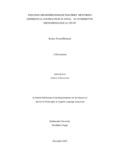
Please use this identifier to cite or link to this item:
https://hdl.handle.net/20.500.14301/477| Title: | Exploring Beginning English Teachers’ Mentoring Experiences and Practices in Nepal: An Interpretive Phenomenological Study |
| Authors: | Bhattarai, Keshav Prasad |
| Citation: | Bhattarai, K.P. (2023).Exploring beginning English teachers’ mentoring experiences and practices in Nepal: An interpretive phenomenological study. |
| Issue Date: | Dec-2023 |
| Publisher: | Kathmandu University School of Education |
| School: | SOED |
| Department: | DOLE |
| Level: | M.Phil. |
| Program: | Master of Philosophy (MPhil) in English Language Education |
| Abstract: | The phenomenon of my research ‘early career stresses as a helpless beginning teacher’ emerged out of my experience of one special event that happened in the first few days of my teaching career when a simple question of a talented girl in the classroom stuck me. That question became a vexing problem when I could not answer it satisfactorily to her in the classroom. That incident made me feel scared for the next day’s class in case I could not find an answer of my own. It was because I could not expect support and help in that remote village of a hilly region, and I didn’t have any online or other resources for my assistance. I felt the dire need for support and help at the workplace. However, I knew there was not any possibility of support and help. In this context, the national curriculum framework of Nepal mentions the support structures or support mechanisms for the teachers. However, it is limited to the occasional teacher’s training, which does not work well practically at the time of need. Thus, the phenomenon ‘early career stresses as a helpless beginning teacher’ led this study to explore English language teachers’ perception of ‘support mechanisms’ and their experiences of receiving and providing ‘support’ at the workplace. Once the phenomenon of this study, ‘my early stresses as a helpless beginning teacher’, triggered my mind, and I intended to find English language teachers who had similar experiences that I had gone through. I located their site and selected them as the participants of my study. Then I got ready to videotape their interview, from which I gathered their lived experiences of receiving support and help or teacher mentoring for their professional development at the workplace. After I ensured full justice to the validation of the phenomenological materials and review of the professional and research literature, I analyzed the phenomenological materials using Interpretive Phenomenological Analysis (IPA) as a method of analysis. As IPA is a detailed exploration of each individual’s experiences, I realized the analysis process is more iterative and inductive for the experiential claims of each participant. In this sense, as an IPA researcher, I came to make a detailed analysis of each participant’s case, called ‘Idiographic Analysis’ by linking parts to the whole and connecting the analysis of each experiential expression iteratively back and forth in various layers of phenomenological reflections, called ‘double hermeneutics’ analysis. Thus, I interpreted each participant’s claims and concerns iteratively based on their lived experiences. After analyzing each case of the participants and each experiential claim of the participants in detail, I came to find some key insights from this study. Firstly, most teachers enter the teaching profession without preparation or any prior knowledge of the teaching and teaching profession. They happen to make an easy entry into the teaching profession whenever they are free or in the gap from one academic level to another. Secondly, the teachers feel ‘reality shock’ as they do not find teaching job as easy as they might have thought or as they cannot meet their ambition and expectation in the teaching profession. Slowly and gradually, many of them quit their jobs in the first few months or years. A few teachers who remain on the job go through a lot of hurdles in teaching and tolerate many ups and downs in their early journey in the teaching profession. Thirdly, the teachers who need to retain and grow in the teaching profession seek help and support at the workplace and in their professional networks and receive informal and unstructured types of support and help from their teacher colleagues, friends’ circles, faculty members, and even from the seniors as there are no formal and structured types of teachers’ support mechanism or teachers mentoring system. Finally, teachers, who remain in the profession, are one of the prestigious and role models of the society, and they enjoy good social life and prestige in the society in the Nepali context. It concludes that there is a dire need to establish formal and structured types of teacher support mechanisms institutionally at the workplace to help teachers develop professionally. |
| URI: | https://hdl.handle.net/20.500.14301/477 |
| Appears in Collections: | Dissertation |
Files in This Item:
| File | Description | Size | Format | |
|---|---|---|---|---|
| Keshav Prasad Bhattarai_final (1).pdf | 1.14 MB | Adobe PDF |  View/Open |
Items in DSpace are protected by copyright, with all rights reserved, unless otherwise indicated.